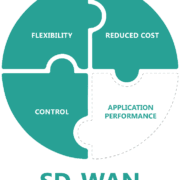How to choose a Cloud Hosting Provider?
Why does the Cloud Hosting provider choice matter?
Migrating business operations, emails, or document storage to the cloud will significantly reduce the cost of running a business, streamline operations, and eliminate the need for in-house IT solutions.
The right cloud hosting provider should ease remote employee collaboration and access to critical business data. In summary, cloud hosting allows SME and Large Enterprises to focus on their core business, as the cloud hosting provider takes care of all the heavy lifting, and handles the IT infrastructure.
Today there are many companies offering cloud hosting services, choosing the right provider for your business is a lengthy and complex process. Like any other business, hosting providers have varying aptitudes, services, and expertise.
The best cloud hosting provider offers secure, reliable, and cost-effective services.
Here are the top attributes you should look into when choosing a cloud service provider.
1. Security
Before shortlisting any cloud hosting provider, assess your security requirements, and ensure that the security level of your candidate hosting providers is at least equal if not higher to your security terms.
Besides, it is crucial to have a good understanding of the responsibilities of each party.
You must understand which security features are offered for free, which ones are paid-for features from the hosting provider.
You should also confirm with the cloud provider that it is compatible with third-party security solutions that you plan to implement in the mid-term as per your IT roadmap.
Find out how GDMS can help you secure your cloud workload with NSX Network and Security Platform.
2. Compliance
When looking for a cloud hosting provider, it is crucial to choose a company that meets your industry-specific compliance needs.
In Laos, GDMS cloud infrastructure is operated from government data center facilities that comply with international build standards.
In Myanmar, GDMS cloud infrastructure is hosted in a private data center facility Tier3 by design.
3. Technologies and Support
Every cloud stack is different. When choosing a cloud hosting provider, ensure that the cloud hosting company uses a cloud infrastructure that is designed for public cloud hosting, is fit for multi-tenancy, with 24/7 vendor support.
Before finally closing the deal with a specific cloud services provider, request to see the architecture design, ask to trial the environment.
GDMS is a VMware certified cloud service provider, the cloud infrastructure is deployed as per VMware Validated Design ensuring that the cloud stack is built as per industry standard of compliance, security, and reliability.
GDMS also offers migration support and assistance, to make the process easy on your part.
4. Reliability and Performance
Downtime can lead to significant monetary losses, especially for companies that rely on cloud services to transact. It is crucial to assess the cloud service provider’s reliability.
To assess the service reliability, ask the cloud provider for its SLA document.
GDMS offers 99.99% on its cloud infrastructure. We offer a comprehensive and transparent SLA agreement that is proof of our commitment to provide a reliable service to your business.
Downtimes are inevitable, what matters is how companies deal with the problem and have processes in place to solve it quickly. GDMS follows the ITIL framework for its support process and has a complete escalation chain in place to ensure smooth and rapid recovery in the event of an outage.
5. Self-Service User Interface
When choosing your cloud service provider, make sure that your environment has an out-of-band interface (management portal) for you to access your applications even in case of an issue.
GDMS leverages vCloud Director Self-Service Portal, a powerful management portal designed for service providers willing to offer self-service capabilities to their tenants. With the portal, users can spin up their virtual machines, scale up and down, create networks and security policies without any intervention from the service provider.
Thanks to a policy-driven approach, end users have isolated virtual resources, independent role-based authentication, and fine-grained control. This meets the current market demand in which users request resources without the involvement of the service provider.
6. Cloud Services
Cloud service providers offer different types of services. The primary kind includes Infrastructure-as-a-service (IaaS), Platform-as-a-Service (PaaS), and Software-as-a-Service (SaaS), which many people think of as the cloud.
The Infrastructure-as-a-service can be cut down into private and public cloud depending on how the infrastructure is shared or managed. GDMS can offer both private and public cloud infrastructure to their customers in Laos and Myanmar.
Public and private cloud offers different levels of privacy, security, and cost suggestions, and can either be managed or unmanaged. GDMS offers by default 24/7 support service. Customers can opt-in for managed services if required.
7. Experience In Migration, Integration, And Configuration
You need to dig a little deeper to find out exactly how much experience your potential cloud hosting service has. The more competent they are, the more likely there will be processes, measures, and contingencies in place.
If you want to make your project a success, run smoothly, and almost free from glitches, choose a provider with in-depth experience.
A solid cloud service provider shall be able to spot potential issues and give you recommendations based on best practices. A reliable cloud provider is passionate about technology and constantly releases new products and services to improve customer experience, service availability, and reliability.
8. Pricing
Before settling on a specific cloud service provider, it is essential to have a solid understanding of the price structure. Many providers will offer low-cost and alluring offers, but the devil is in the details, or in the footnote in our case. Check what services they are offering, review all the price points, and anticipate your growth for the next few years. While it does not mean all affordable cloud services are questionable, they can become extremely expensive in the long run as your estate grows.
GDMS offers a clear and transparent pricing structure with no hidden fees. Our offering including pay as you grow, reserved price as well as burst price option. No matter your company size, we have a pricing model that will suit your budget.
9. Datacenter locations
If you plan to use the VPS as a front-end server for your online customers or end-users then the datacenter locations do matter a lot.
Even if there is only one location available, there must be one that is close to your visitors. The round trip time between your server can be anything between 10ms and 300ms, 10ms within the country for example, and 300ms between the US east coast and Australia. A typical website will require at least 3 sequential round trips before the first page can begin rendering. That may not be the biggest factor delaying the page display but the impact of round trip time should not be overlooked.
GDMS Cloud Infrastructure is deployed in facilities respectively in Vientiane, Laos, and Yangon, Myanmar. Our data center facilities have been selected for their dense peering with domestic networks to ensure your applications are accessible with low latency no matter from which network you try to connect from.
GDMS also offers CDN (Content Distribution Network) services to cache static files and accelerate the delivery of your web applications. A CDN will improve the user experience and reduce the load on your servers.
Find out more about our VPS solutions in Myanmar
Find out more about our VPS solutions in Laos
FInd out more about our cloud backup services
Interested by Colocation? Check out our guide to choose a datacenter facility.












